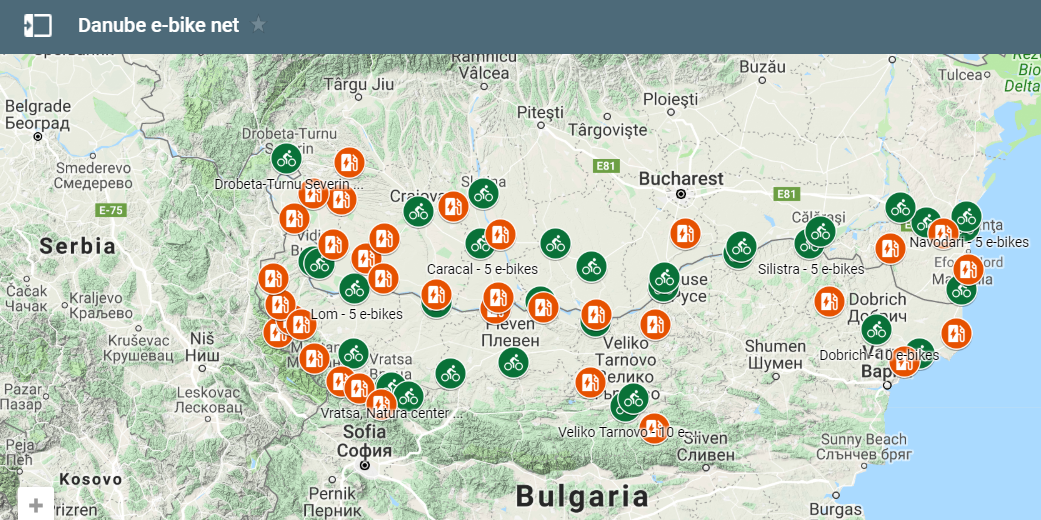Safe Schools Network (ROBG-20)
What’s the goal?
| Raising awareness in the field of efficient risk prevention trough formal and informal education of children and youth in border area (Vidin and Montana districts, Bulgaria and Dolj county, Romania) through creation of an international network of “Safe schools” |
What’s the budget?
288,084.21 euro, out of which 244,871.58 ERDF
Who?
Lead beneficiary (LB): Free Youth Centre, Bulgaria
Beneficiary 2 (B2): Vasiliada Association
Beneficiary 3 (B3): Regional Network for Innovative Education (RNIE)
When?
Start date: 03.02.2016
End date: 02.02.2018
Duration: 24 months
Where?
Vidin and Montana in Bulgaria.
Dolj in Romania.
How?
| The project aims at raising awareness in the field of efficient risk prevention through formal and informal education of children and youth in 20 schools, achieved through creation of an international network of Safe schools, educational institution focused on disaster protection, who collaborate in this field and share good practices. |
Results (what’s the contribution to the Programme)?
|
Programme outputs: 10,000 people benefiting from actions of risk management Programme results: the quality of the joint risk management in the CBC region will be improved |
Project status
The project was finalised in February 2018.
Two press conferences were organized in Craiova and Vidin to inform the general public about the project. 30 local communities were also visited (15 per country) and the project was presented before 469 representatives of the target groups.
A comparative research was realized, two international meetings were implemented and methodology was set for preparation of school management, teachers and students for risk prevention. Series of trainings designed to improve the preparedness of 20 schools in BG and RO in case of disasters were realized.
Training of trainers (volunteer club leaders) were organised in both countries - 07-10.09.2016 in Bulgaria and 12-15.01.2017 in Romania.
Trainings for school management took place in Bulgaria (17-18.11.2016) and Romania (16-17.01.2017).
Trainings of teachers/methodological experts took place in Bulgaria (21-24.11.2016) and Romania (12-16.02.2017).
Trainings for psychologists took place in Bulgaria (25-26.11.2016) and Romania (25-26.01.2018).
40 Volunteer clubs in 10 Bulgarian schools and 10 Romanian schools were set up with a total of 640 students involved in the clubs. The extracurricular activities of the clubs carried out in the 2016-2017 school year included theoretical knowledge and practical exercise in disaster protection, including joint projects of the network and preparation for the national competitions, which took place in both Bulgaria (15-16.06.2017) and Romania (22-23.09 2017) with the participation of educational and school authorities, teachers, students, as well as the media.
The winners from the two national competitions in Bulgaria and Romania were invited to take part in the International camp organized in Varshets, Bulgaria in the period 4-8 October 2017. The camp included training session on acquiring additional skills in leadership, volunteering, networking, project development, as well as an international practical competition in disaster prevention won by Technological College Șhe ca Milcu from Calafat, Dolj County.
A “Conclusion forum” designed to report results, achievements and lessons learned, to evaluate, disseminate and plan the future of the network took place on 07-08.12.2017 in Craiova.
More information on the project and the “Safe-school network” created is available on the project web-site– www.safe-schools.eu.
ROBG-2 Intermodal CBC
“Investigation of opportunities for reducing the TEN-T network use within the cross-border region Romania-Bulgaria through optimization of the freight and passenger transport and the development of a joint mechanism for support of the intermodal connections”
What’s the goal?
| A joint mechanism to facilitate the connection of secondary/tertiary nodes to TEN-T infrastructure in the CBC area |
What’s the budget?
1,428,765.73 euro, out of which 1,214,450.87 ERDF
Who is doing it?
Lead beneficiary (LB): Association of Danube River Municipalities “Danube”, Belene, Pleven (Bulgaria)
Beneficiary 2 (B2): The Ecological Initiative and Sustainable Development Group Foundation - E.I.S.D.G Foundation
When is it happening?
Start date: 03.02.2016
End date: 02.02.2018
Duration: 24 months
Where is it happening?
Veliko Tarnovo, Pleven, Vidin, Vratsa, Ruse and Dobrich in Bulgaria (+ Sofia).
Giurgiu, Mehedinţi, Calarasi, Constanta, Dolj in Romania (+Bucharest).
How is it going to happen?
- 1 preliminary study on intermodal nodes’ current state and their capability to enhance the TEN-T network within the CBC area
- 1 common strategy on TEN-T network enhancement through improving intermodal nodes’ capacity
- 8 round tables
What will be the results (what’s the contribution to the Programme)?
Programme outputs: 1 joint mechanism created
Programme results: 4,770,000 people will be served by modernized infrastructure leading to TEN-T
Project status
The implementation period of the project was finalized on 02.02.2018.
The project was opened with 2 press conferences in Ruse and Craiova.
The common preliminary study on the current state of the intermodal nodes and the possibilities to upgrade the TEN-T was realized. The Study was discussed during 4 dedicated roundtables organized in June 2017 during which the cross-border area stakeholders provided feedback.
Based on the results of the Preliminary Study, the Lead Beneficiary commenced the elaboration of the Common Strategy on TEN-T network enhancement through improving intermodal nodes’ capacity. The three variants for vision, mission, objectives and priorities of the Strategy were discussed during 4 round tables with stakeholders organized in November 2017 and the final version was delivered by the contractor in December 2017.
The project main outputs include a preliminary study of the current state of the intermodal nodes in the cross-border area and their capability to enhance the TEN-T network and a common strategy on TEN-T network enhancement through improving intermodal nodes’ capacity. The scope of the preliminary study was to investigate the current state of the transport systems and intermodal nodes in the cross-border region and select the optimal variant for the development of the intermodal transport in the region. Based on the variant selected as a result of the 4 round tables with stakeholders several priority projects and development directions were established of the Study, which following the discussions with the stakeholders during the next round tables, and the input from the project beneficiaries, resulted in a list of priority projects, set out in the Strategy (Annex 5). The Strategy itself, defines the roles and provides guidelines for the activities of the project partners for ensuring the necessary premises, including advocacy for legislative initiatives, facilitating partnerships, provision of information and expertise, mobilization of support at all levels, etc. for the realisation of those priority projects and development directions, as established within the Study.
The Strategy is based on the premise that the realization of the above mentioned measures will result in the effective implementation of the priority projects and therefore to the modernization of the infrastructure leading to TEN-T networks. In this sense the achievement of the proposed contribution to the Programme result indicators implies not only the implementation by the project partners of the measures set out in the Strategy, but also on the effective implementation of the priority projects recommended in the Study and established in the Strategy.
Therefore, the contribution of the project to the Programme result indicator “People served by modernized infrastructure leading to TEN-T” will be monitored during the project sustainability period.
E-bike Net (ROBG-1)
What’s the goal?
A network of electrical bicycles, which people can use to move freely in the whole cross-border area (32 towns).
What’s the budget?
762,085.72 euro, out of which 647,772.86 ERDF
Who?
Lead beneficiary (LB): Agency for Regional Development and Business Center – Vidin (Bulgaria)
Beneficiary 2 (B2): Vidin chamber of commerce and industry
Beneficiary 3 (B3): Romanian Association for Electronic Industry and Software Oltenia
Beneficiary 4 (B4): Local Employers’ Association for Small and Middle Enterprises Calafat
When?
Start date: 02.02.2016
End date: 01.02.2018
Duration: 24 months
Where?
Veliko Tarnovo, Pleven, Vidin, Vratsa, Ruse and Dobrich in Bulgaria (+ Sofia).
Giurgiu, Mehedinţi, Calarasi, Constanta, Dolj in Romania (+Bucharest).
How?
- 32 towns will be equipped with e-bike stations;
- 70 e-bike charging station points will cover the whole cbc area;
- (at least) 480 people will participate in e-biking events within the project;
- 2350 e-bikes will be provided within the project;
- 2 studies for connectivity of e-bike Net to TEN-T infrastructure and recommended e-bike routes will be realized;
- 18 e-biking events – promotional tours and festivals will be organized to promote e-biking as sustainable individual mobility option.
The results (what’s the contribution to the Programme)?
Programme outputs: 1 joint mechanism created (e-bike network).
Programme results: Cross border population (95.000 people) served by modernized infrastructure leading to TEN-T
Project status
The project was finalised. The e-bike network was set up and consists of 240 e-bikes stationed in 32 towns in eligible area and 70 charging stations placed in 68 towns in the eligible area.
The e-bike network was broadly promoted via cross-border tours, including dedicated tours for elderly. The network was also promoted to tour operators and journalists within dedicated promotional tours, as well as international tourism fairs.(Pictures from the events and more details about where the electrical bikes can be found on the project website: http://danube-ebike.net/.
A detailed map of the operators and charging stations can be accessed at: http://danube-ebike.net/en/network/ (see a picture below). In the susteinability period, the beneficiaries of the project are working on to ensure full functionality and accesibility of the network.

A short description of the contracted Soft projects is available below:









